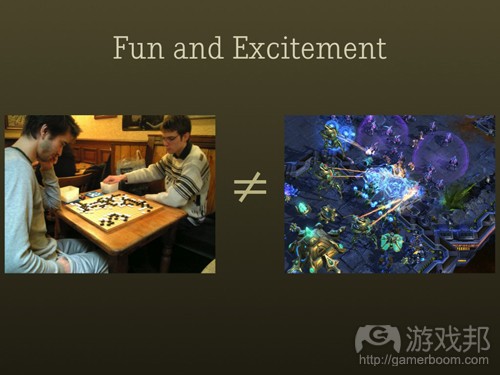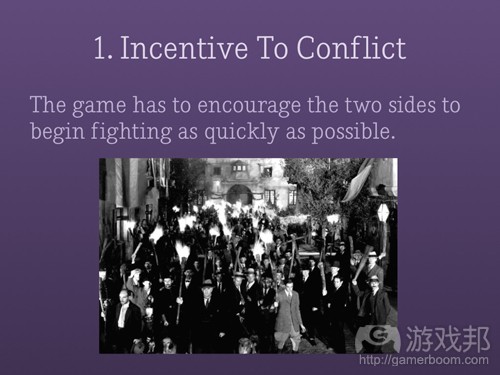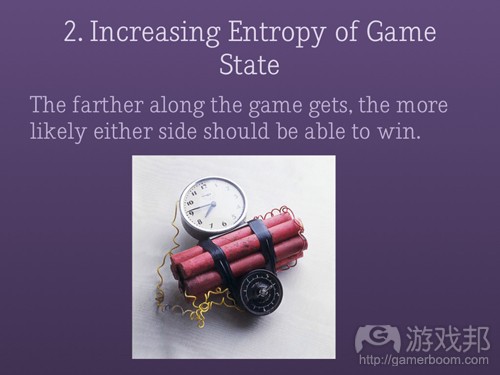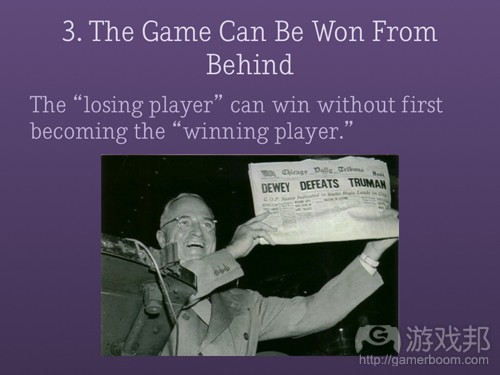Lolapps设计师谈策略游戏趣味性及兴奋感来源
作者:Evan Jones
我是社交游戏公司Lolapps成员,是《Ravenskye City》游戏玩法程序员以及一款未发布游戏的设计师。今天我主要和各位分享有关策略游戏趣味性和兴奋感的内容,并以象棋、《星际争霸》和《英雄联盟》为例进行说明。
我们知道有许多游戏都像象棋一样既有趣又有深度,但却不一定和象棋一样令人兴奋。我认为象棋与《星际争霸》这种游戏之间还是存在不少区别,但并不认为图像、音效或者实时模式是两者差异的根源,我认为二者的最大不同在于游戏设计本身。
这里所说的“兴奋感”有何含义?简单而言,它就是由戏剧性创造出的刺激感。为了生动呈现戏剧性内容,你必须让它具有活力,植入无法预测结果的持续冲突。以《Peggle》为例,当你瞄准一个目标时,游戏根本就没有兴奋感,只有其中的球体开始运动,但却无法预知结果时,游戏才会产生戏剧性。
所以令人兴奋的游戏首先要有产生冲突的动机,要让双方尽快开战。毕竟让所有人等太久难免产生无聊感。重要的是游戏本身必须具有产生冲突的理由,让玩家知道长期按兵不动只会让形势更为不利,不能让玩家无缘无故就向对方开火。
在象棋游戏中,游戏界面的开放性活动让玩家产生直接迅速的冲突。你所有的好棋最初都躲在一批兵卒之后,你得让兵阵前移,越接近对方的阵营,游戏就越快展开战争。
在《星际争霸》中,你得快速侦察对方的状况以知晓自己下一步行动,然后尽快消灭对方的侦察兵,以免向敌人泄露军情。不管是先采取哪一步行动,你都得立即组建一小支军队,迅速进入备战状态。
在《英雄联盟》中,你在游戏开始之初的力量薄弱,只有获得足够的经验值才能升级,否则就有可能落后他人。游戏系统会自动向地图中央发送可供玩家获取经验值的单位,玩家得向地图中央前进与对手抢夺资源。
与这种规则相反的模式是《最终幻想策略版》,这款游戏的刺激感在于AI极具攻击性,因为威胁会产生戏剧性。在多人模式中,玩家体验游戏的方式更为保守,所以较缺乏趣味性。
其次,令人兴奋的游戏还需增加游戏状态的熵(游戏邦注:一种热力学函数)。换句话说,就是随着游戏的发展,游戏中任意一方获胜的机率就会越大。原先落后的玩家也会因游戏发展而获得转败为胜的机会。这一点很重要,毕竟人人都希望游戏有个令人印象深刻的结局,而非不紧不慢地熬到游戏终止。
刚开始玩象棋时,国王总会被层层保护起来,玩家双方都有许多强大的棋子。但随着游戏发展,由于手头上剩余的兵力越来越少,玩家愈发难为国王护驾。而另一名玩家也会遭遇同样的情况,这时其中一方发起猛攻拼死一搏的机率也会加大。
玩家在《星际争霸》早期的战斗中,双方可能都会先派遣10个单位的兵力,如果是打近身战,胜者可能剩下2个单位的兵力成功脱身。但在后期的战斗中,双方一般都会调出100个单位的兵力,但就算是在势均力敌的战斗中,有20个兵力的军队就足以给对方造成重创,加快结束游戏的进程。
而在《英雄联盟》战斗中,失势的一方之后受到的惩罚会随游戏发展而增加。在游戏早期,如果一个群体被消灭,另一个群体可能会暂时得势,但他们的力量仍然很薄弱,因为被灭掉的一方很快又会再次复活。在游戏后期,双方队伍都很强大,如果其中一方被灭,其复生所需的时间不但会加长,而且会给幸存的另一方创造可趁之机,让他们变得更为强大,毫无压力地拿下游戏目标。
这种规则的反例是《文明》,这款游戏始于不稳定的状态,但随着时间发展会趋于更稳定的情况。在接近游戏尾声时,你确实需要想出一个获胜的妙方,而且很难扭转原来的形势。
最后一点就是,令人兴奋的游戏必须提供反败为胜的机会。这意味着玩家无需在开始时占据领先优势,也有可能成为最后的赢家。当大家都知道哪一方会获胜之时,这种戏剧性也将戛然而止,游戏就开始变得索然无味。如何才能在游戏设计中实现这一点?那就是分配游戏获胜的条件和要素。
以《星球大战》为例,当其中双方进入最后一战时,其戏剧性来源于双方都无限接近胜利的终点。也就是说,双方离成功都是咫尺之遥!假如反抗者是一步步走向胜利,慢慢打败Death Star,那么这场战争还有何刺激性可言呢?
在象棋游戏中,就算你真的占据天时地利,也还是不可能高枕无忧,因为走错一步棋就有可能造成满盘皆输的结果。假如获胜条件是消灭对方所有的棋子,这显然比只抓到对方国王更困难,可能有人会认为征服更多棋子会产生更多戏剧性,但这实际上会让游戏趣味性大打折扣,因为其中的戏剧性早在游戏结束之前就已中止。
在《星际争霸》中,玩家可采用多种策略带来以少胜多的结果,例如在敌人能够察觉之前抢先推出隐形部队,在敌人基地之外建设防御大炮以侵犯其领土。结果呢?就算你拥有强大的兵力,但只要找错了攻击点就有可能失败。
在《英雄联盟》中,失败的一方还可以采用“曲线救国”方式扭转颓势。他们不会再去攻击敌方部队,而是直捣对方大本营,在敌人回营之前摧毁基地。失势的队伍通过这种方式也还是可以用更少的兵力获得胜利。
这种规则的反例是《Risk》,与其他许多采用拔河式的拉锯战游戏一样,《Risk》在接近尾声之时非常无趣。原因在于双方都发展了庞大的军队,但没有一方会获胜,因为交战的代价太惨重了,这就导致了玩家最后都会踌躇犹豫,止步不前,从而损害了游戏体验。
游戏邦注:原文选自作者2011年10月19日在旧金山IGDA设计师交流之夜的幻灯片内容。
(本文为游戏邦/gamerboom.com编译,拒绝任何不保留版权的转载,如需转载请联系:游戏邦)
What Makes Strategy Games Exciting?
by Evan Jones
The following is a rough recollection of a talk I gave at the San Francisco IGDA’s Pecha Kucha night on October 19, 2011. I don’t have a recording of the talk, so this is a composite of my notes and what I said, to the best of my memory. As a result, this piece is a bit more conversational than my typical writing style.
Pecha Kucha is a format where the speaker presents twenty slides of twenty seconds each, and the slideshow automatically advances. The challenge to the speaker is to present his or her points in a concise manner. It’s a difficult but rewarding format!
Hi, I’m Evan Jones. I work for Lolapps, where I’m a gameplay programmer on Ravenskye City and a designer on an unannounced project. Today I want to talk about strategy games – particularly the difference between what’s fun and what’s exciting, and the threads in common between Chess, Starcraft, and League of Legends.
There are lots of games like go that are fun and deep, but they aren’t really that exciting. And I feel like there’s something that separates a game like go from a game like Starcraft. I don’t think it’s the graphics or the sounds or the fact that one’s in real time. I think it’s in the design of the game itself. (In this talk, I’m not going to cover asymmetrical games or score-based games.)
So what do we mean when we say “exciting?” In short, drama creates excitement. And in order for drama to work, you need there to be active, sustained conflict with an uncertain outcome. Take Peggle, for example. It’s not the least bit exciting while you’re aiming a shot – it’s only when the ball is in motion, and the outcome is uncertain, that the drama happens.
So the first thing an exciting game needs is an incentive to conflict. The game has to encourage the two sides to begin fighting as quickly as possible. Why? Waiting around for something to happen is boring. What’s important is that the game itself has to provide the reason for the conflict by having a disadvantage to standing still. It can’t expect the players to charge into each other just because.
In chess, the opening moves of the game place players in direct, immediate conflict. All your good pieces start out behind a wall of pawns, so you have to move the wall forward. And you start the game close enough that you’re fighting the other player as soon as you move the pieces forward.
In Starcraft, you have to scout your opponent as quickly as possible to find out whether you’re getting rushed or not. And then you have to destroy your opponent’s scouts as quickly as possible so you can get back to building in secret. Either way? You have to build a small army immediately. This jump-starts the conflict.
In League of Legends, you’re weak in the beginning of the game and you need to gain experience to level up; otherwise you’re going to fall behind really fast. The game automatically sends units out to the middle of the map that provide experience points. So you have to go out to the middle of the map – and that’s exactly where your opponents are going to be.
An antipattern to this rule is Final Fantasy Tactics. The reason why FFT is exciting is because the AI is aggressive for no good reason. It doesn’t need to be; it just is, because threats create drama. In a multiplayer match, players play much more conservatively, and it’s less interesting.
The second thing an exciting game needs is increasing entropy of game state. In other words, the farther along the game gets, the more likely either side should be able to win. This works both ways: the player who is behind should have a higher chance of winning too the farther along the game goes. Why is this important? You want the game to end with an explosive finale, not a slow trickle – it creates more memorable endings.
In chess’s early game, the king is totally protected and both players have lots of powerful pieces. But as the game goes on, it gets harder to protect your king because you have fewer pieces to defend it. But it’s likely the other player is in the same boat, so the odds of one of you being able to set up a checkmate increases.
In an early game fight in Starcraft, both players might go into the battle with 10 units. If it’s a close fight, the winner might escape with 2 units: no big deal. But in a late game fight, where both players go in with 100 units, even if it’s a close match, an army of 20 units is enough to do serious damage, causing the end of the game.
In League of Legends, the penalties for losing a team fight increase over time. In the early game, if one team gets wiped, the other team can push a bit in their favor, but they’re still weak and the wiped team will respawn soon. In the late game, both teams are nearly godlike, and if one of them gets wiped, not only are the respawn times longer, but the surviving team is strong enough to take out the main objective without any resistance.
An antipattern to this rule is Civilization. Maybe it’s the nature of what it’s trying to mimic, but Civilization starts out in an unstable state and gets more stable over time. Near the end of the game, you really have a good idea of who has a decent shot of winning and how. It gets really difficult to change things.
The final rule is that an exciting game needs to be winnable from behind. This means that the losing player needs to be able to win without first becoming the winning player. At the moment both players know who is going to win, the drama ends, and the game becomes boring. How do you accomplish this in a game’s design? Detach your victory condition from your means of accumulating power.
This one’s so important that I’m dedicating two slides to it. Take Star Wars, for example. When it gets down to the final battle, the drama comes from the fact that both sides are getting closer to their victory conditions. By the end of it, each side is literally seconds away from winning! It would be boring if the rebels won by gradually whittling the Death Star down.
In chess, even if you’re in a really powerful position, you never feel truly safe because one check can lead to a sequence of forced moves that cost you the game. Imagine if chess’s victory conition were eliminating all of the opponent’s pieces. This is actually harder to do than capturing only the king, and intuitively one might think that more capturing equals more drama. But it’d be boring, because the drama ends long before the game does! (Try it if you don’t believe me.)
In Starcraft, there are plenty of tactics that allow players with small armies to inflict big damage. Getting invisible units before your enemy gains the ability to detect them. Building defensive cannons outside the enemy base and encroaching on their territory. The net result? Even if you have the stronger army, if you’re building up against the wrong kind of threat, you lose.
In League of Legends, the losing team can backdoor their way to victory. The backdooring player says “I’m not going to fight the enemy team; I’m just going to march into their base and destroy it before they show up.” In this way the losing team can win even while controlling less power on the field.
An antipattern to this rule is Risk. Like many games that follow a tug-of-war pattern, this game gets really boring near the end. The reason is that as both players develop a critical mass of units, neither player gets closer to winning because the cost of engagement is too high. So players have a tendency to turtle up and do fewer things.(source:gamasutra)













































